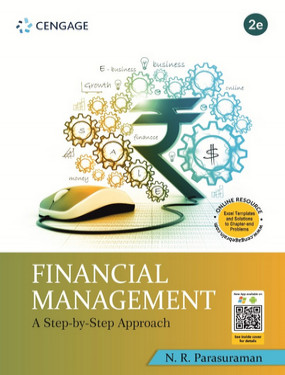Packed with current examples from companies you know, CONTEMPORARY FINANCIAL MANAGEMENT, 14e, equips you with the knowledge and skills to enhance enterprise value, manage risk, and effectively manage cash flow. Completely up to date with the latest developments from the field, the text explores the international aspects of financial management, the ethical behavior of managers, the unique finance-related concerns of entrepreneurs, and the effects of the 2008-2009 recession. Chapter-opening "Financial Challenges," integrative cases, and other learning features highlight critical concepts and enable you to apply what you learn to real-world practice. Excel® templates allow you to use technology to achieve financial management objectives.
- Chapter-opening “Financial Challenges” present real-world scenarios to introduce key concepts and engage students from the start.
- Integrative Cases with Excel® at the end of chapters provide hands-on practice using spreadsheet tools for financial analysis.
- “Foundation Concepts” icons highlight the most essential finance principles within each chapter to guide focused study.
- “Ethical Issues,” “International Issues,” and “Entrepreneurial Issues” boxes encourage discussion on broader business challenges.
- The Instructor’s/Solutions Manual is thoroughly prepared and class-tested to ensure accuracy and ease of use.
- The 14th edition is fully updated with revised text, examples, problems, learning objectives, footnotes, and web references.
- MindTap® for Finance offers a personalized digital learning experience with dynamic assignments, real-time analytics, and study tools.
- Fourteen new chapter-opening Financial Challenges feature well-known companies like Apple, Twitter, and Hershey, with all others updated for current relevance.
- Problem solutions often include multiple solving methods and are tagged by difficulty level to help students and instructors plan effectively.
- Selected problem answers are included in an appendix to support student learning and progress.
Part I: INTRODUCTION.
1. The Role and Objective of Financial Management.
2. The Domestic and International Financial Marketplace.
3. Evaluation of Financial Performance.
4. Financial Planning and Forecasting.
Part II: DETERMINANTS OF VALUATION.
5. The Time Value of Money.
6. Fixed Income Securities: Characteristics and Valuation.
7. Common Stock: Characteristics, Valuation, and Issuance.
8. Analysis of Risk and Return.
Part III: THE CAPITAL INVESTMENT DECISION.
9. Capital Budgeting and Cash Flow Analysis.
10. Capital Budgeting: Decision Criteria and Real Option Considerations.
11. Capital Budgeting and Risk.
Part IV: THE COST OF CAPITAL, CAPITAL STRUCTURE, AND DIVIDEND POLICY.
12. The Cost of Capital.
13. Capital Structure Concepts.
14. Capital Structure Management in Practice.
15. Dividend Policy.
Part V: WORKING CAPITAL MANAGEMENT.
16. Working Capital Policy and Short-Term Financing.
17. The Management of Cash and Marketable Securities.
18. The Management of Accounts Receivable and Inventories.
Part VI: ADDITIONAL TOPICS IN CONTEMPORARY FINANCIAL MANAGEMENT.
19. Lease and Intermediate-Term Financing.
20. Financing with Derivatives.
21. Risk Management.
22. International Financial Management.
23. Corporate Restructuring.
Charles Moyer
Charles Moyer is Professor of Finance and Entrepreneurship and Dean Emeritus of the College of Business at the University of Louisville, earned his BA in Economics from Howard University and his MBA and PhD in Finance and Managerial Economics from the University of Pittsburgh.
James R. McGuigan
James R. McGuigan owns and operates his own numismatic investment firm. Prior to this business, he was Associate Professor of Finance and Business Economics in the School of Business Administration at Wayne State University.
Dr. Ramesh P. Rao
Dr. Ramesh P. Rao is a professor and holds the Paul C. Wise Chair of Finance in the William S. Spears School of Business, Oklahoma State University.













